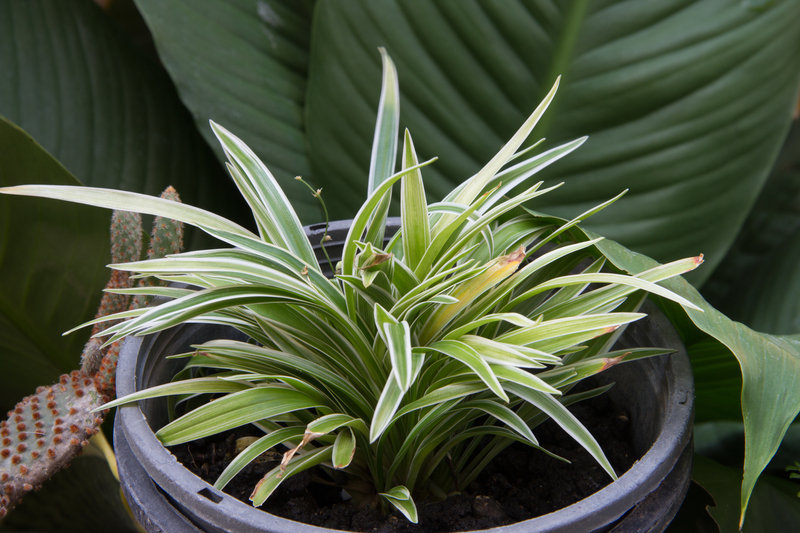Outsmart Weeds: 3 Tips from the Experts
Posted on 20/06/2025
Outsmart Weeds: 3 Tips from the Experts
Are you tired of battling persistent weeds in your lawn or garden? You're not alone. Weeds are one of the most common and bothersome problems for gardeners and homeowners, robbing your plants of nutrients, water, and sunlight. But what if you could finally outsmart weeds, and keep your landscape lush and healthy? In this comprehensive guide, we share three expert weed control tips to help you win the war against weeds--once and for all.
Why Outsmarting Weeds Matters
Weeds can quickly invade and overwhelm your garden. They not only create a messy appearance but also:
- Compete with desired plants for water, nutrients, and light
- Harbor pests and diseases
- Reduce crop and flower yields
- Release seeds for future infestations
Preventive weed control strategies are vital for maintaining a vibrant and pest-free landscape. Whether you're a novice gardener or a seasoned horticulturist, the following professional tips will help you outsmart weeds using sustainable, efficient, and eco-friendly methods.

1. Mulch Mastery: Create an Impenetrable Weed Barrier
Mulching is a cornerstone of expert weed management. The simple act of applying a layer of organic matter or landscape fabric over your soil:
- Blocks sunlight, depriving weed seeds of the light they need to sprout
- Helps conserve soil moisture for your plants
- Adds nutrients to the soil as mulch decomposes
- Enhances the overall health and appearance of your garden beds
Choosing the Right Mulch
Not all mulches are created equal when it comes to outsmarting weeds. Experts recommend:
- Organic mulches: Wood chips, shredded bark, straw, pine needles, and compost work well. They're eco-friendly and improve the soil structure over time.
- Inorganic mulches: Black plastic, landscape fabric, and gravel are excellent for paths and non-plant areas. They offer long-term weed control but don't enrich your soil.
For most flower beds and vegetable gardens, organic mulches are preferred because of their soil-enhancing benefits.
How to Mulch Effectively:
- Apply 2-4 inches of mulch evenly across your garden beds.
- Keep mulch away from plant stems and tree trunks to prevent rot.
- Replenish mulch regularly to maintain its thickness and efficiency.
- Consider landscape fabric under mulch in high problem areas for extra protection.
With these simple steps, you create a potent physical barrier that prevents most weeds from ever breaking through--making you one step closer to a weed-free oasis.
2. Cultivate Smart: Manual and Mechanical Weed Removal
Even with the best mulching practices, some weeds will inevitably appear. Expert gardeners know that catching weeds early is crucial to prevent them from seeding and spreading. Here are highly recommended methods for effective weed removal:
Hand-Pulling: The Classic Technique
For young or small infestations, nothing beats pulling weeds by hand. Here's how to master this time-tested method:
- Weed after rain or irrigation; moist soil makes it easier to get the whole root system.
- Remove the entire weed, including roots. Many invasive weeds regrow from even small root fragments.
- Dispose of weeds properly. Don't compost weeds with seeds or perennial roots.
Tools & Tactics for Tough Weeds:
- Garden hoes and weeders: Slice or uproot weeds quickly, ideal for larger sections.
- Flame weeders: Use controlled heat (propane torches) to scorch weeds along paths and driveways--ensure you follow all safety guidelines.
- Mulching after removal: Once weeds are cleared, cover exposed soil to prevent new growth.
Pro Tip: Never let weeds go to seed. One dandelion plant can produce more than 2,000 seeds--all set to invade your space next season.
When to Use Mechanical Control?
Not all weeds can be managed by hand, especially those with deep taproots or spreading runners. In such cases, use:
- Soil cultivators for shallow-rooted annuals
- Weed pullers or extractors for deep-rooted perennials like dandelion and dock
- Broadfork or spade for larger infestations before replanting an area
3. Preventative Landscaping: Outsmart Weeds Before They Start
Prevention is the true key to outsmarting weeds. The best weed is the one that never grows! This proactive approach involves creating conditions that favor your desired plants--and leave no space for weeds.
Dense Planting: Fill the Gaps
Weeds thrive in open soil. By planting densely, you effectively shade the ground, reduce exposed soil, and choke out opportunistic weeds. Here are expert tips:
- Choose groundcovers, spreading perennials, or closely spaced vegetables to quickly cover the soil.
- Interplant crops: Grow fast and slow movers together (e.g., lettuce under tomatoes) to maximize coverage.
- Succession sowing: As soon as an area is harvested, replace with another crop or cover crop--don't let weeds move in!
By thickening your planting strategy, you not only beautify your garden but also drastically reduce weed pressure.
Soil Improvement: Build a "Weed-Resistant" Garden
Unhealthy, compacted soil is a magnet for weeds. Weeds often succeed where grass and garden plants struggle. To outmaneuver weeds at the foundation, focus on:
- Regularly adding compost and organic matter to promote vigorous, competitive growth of your desired plants.
- Maintaining optimal soil pH for your plant selection (most vegetables and flowers prefer slightly acidic to neutral soil).
- Avoiding excessive tillage, which brings dormant weed seeds to the surface.
Edge and Path Maintenance: Don't Let Weeds Spread
Experts recommend maintaining clean, well-defined edges along garden beds and keep pathways weed-free. Here's how:
- Install edging materials (metal, stone, or plastic strips) to block grass and creeping weeds.
- Mulch or use landscape fabric on paths to halt weeds before they reach your beds.
- Regular spot checks and quick removal keep edges tidy and prevent infestations from creeping in.
Attention to borders and paths is a simple habit that makes a tremendous difference in minimizing overall weed problems.
Bonus: Organic Herbicides and Spot Treatments
While the three strategies above form the backbone of expert weed control, there may be cases--such as driveways, patios, or stubborn perennial weeds--where targeted treatments are necessary.
Eco-Friendly Weed Killers:
- Vinegar sprays (5-20% acetic acid) for young weeds on hard surfaces
- Boiling water poured directly onto weeds (best for cracks and paths)
- Corn gluten meal as a pre-emergent to suppress germination in lawns (timing is crucial!)
Use these spot treatments carefully, and always read label instructions. Organic herbicides are non-selective--they will kill or damage any plant sprayed.
Frequently Asked Questions
How often should I weed my garden?
The more frequently you weed, the easier the job becomes. Expert gardeners recommend a quick inspection and removal at least once per week, especially during the growing season.
Are chemical herbicides necessary?
Many home gardeners succeed without synthetic herbicides by focusing on weed prevention, dense planting, mulching, and regular hand weeding. Herbicides should be a last resort and used with extreme caution.
What's the best way to prevent weed seeds from spreading?
Never let weeds go to seed. Remove any flowering or seed-producing weeds immediately. Clean tools and shoes after working in infested areas and avoid bringing contaminated compost or mulch into your garden.

Expert Insights: Outsmart Weeds All Year Long
- Spring: Start season with mulching and dense planting. Monitor new growth closely.
- Summer: Maintain mulch, water wisely, and weed regularly to prevent seeding.
- Fall: Plant cover crops, clear beds promptly, and mulch again before winter.
- Winter: Plan crop rotations and landscape improvements for better weed control next season.
By adopting a year-round, proactive weed management strategy, you dramatically reduce the time and effort needed for weeding over the long term.
Conclusion: Outsmart Weeds and Transform Your Garden
Winning the war against weeds isn't about working harder--it's about working smarter.
Through mulching mastery, smart cultivation, and preventative landscaping, you can successfully outsmart weeds and cultivate the healthy, beautiful yard or garden you've always wanted. Remember, the key is consistency and adapting techniques to your unique space. Don't let weeds outwit you--take action today, and enjoy a lush, vibrant landscape season after season!
Are you ready to transform your garden and outsmart those stubborn weeds? Put these expert tips to the test, and watch your outdoor space flourish.
For more in-depth guides on organic gardening and sustainable landscape management, stay tuned to our blog!
Latest Posts
Empower your garden to contribute to climate change solutions
A closer look at the joys of container gardening
Unearthing the Joy of Raising a Herb Garden

